|
|
|
Sort Order |
|
|
|
Items / Page
|
|
|
|
|
|
|
| Srl | Item |
| 1 |
ID:
131415
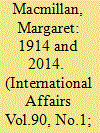

|
|
|
|
|
| Publication |
2014.
|
| Summary/Abstract |
The outbreak of the First World War remains a great historical puzzle and a source of concern, for if we do not understand how it came about we run the risk of stumbling into a similar catastrophe. This article draws parallels between the world of 1914 and the present. It starts with comfortable assumptions made by so many, then and now, that a major conflict was impossible or improbable and then looks at the paradox that globalization not only made the world more interdependent and linked, but also fostered intense local and national identities. It suggests factors that propelled Europe to war in 1914, including national rivalries, imperialism, the arms race and a shifting power balance between rising and declining powers, as well as ideologies and assumptions such as Social Darwinism and militarism, and points out that similar forces and ideas are present today. The article also stresses the dangerous complacency that can arise as a result of decision-makers having successfully dealt with a series of crises. European decision-makers also assumed that they could successfully use war as an instrument of policy and largely ignored or explained away the mounting evidence that the advantage in conflict was swinging to the defence. Again, as the author points out, there are disquieting parallels with the present.
|
|
|
|
|
|
|
|
|
|
|
|
|
|
|
|
| 2 |
ID:
131427
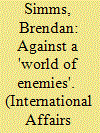

|
|
|
|
|
| Publication |
2014.
|
| Summary/Abstract |
Adolf Hitler's experiences during the First World War have been much discussed, with historians tending to concentrate on his involvement in the fighting and the operational lessons he later claimed to draw. Much less has been written about the impact of the war on his world view, though recent work has tended to suggest that his paranoid anti-Semitism was not yet visible during the conflict. Drawing on this latest research, but also on newly discovered sources and previously underused material, the author shows that Hitler's main preoccupation during the war and its immediate aftermath was the overwhelming power of Great Britain and its American ally. He associated these two powers with the alleged international Jewish economic conspiracy that had crushed the German empire. Hitler's anti-Semitism thus originated in an anti-capitalist, rather than anti-communist, discourse. He blamed Britain and the US for the rigours of the Versailles peace settlement, a moment which was far more politically formative for him than the experience of defeat itself. His encounter with American soldiers in the summer of 1918 also marked his first engagement with the global power of the United States and the start of a belief in the demographic weakness of the German empire which inspired his plans for Lebensraum in the east.
|
|
|
|
|
|
|
|
|
|
|
|
|
|
|
|
| 3 |
ID:
124535


|
|
|
|
|
| Publication |
2013.
|
| Summary/Abstract |
This study examines Al Qaeda's organizational dynamics, doctrinal precepts, strategic objectives, operational priorities, and tactical vectors in the context of its Twenty-Year Strategic Plan. This seven-stage Strategic Plan is addressed with a particular focus on its current phase (Stage 5), 2013-2016, involving the mobilization of Muslim forces for the "Declaration of the Caliphate." In this regard, particular attention is paid to the Al Qaeda engagement in militant jihadist campaigns across the Middle East and other Muslim domains. The study concludes with an overall assessment of global threats and ongoing risks arising from the current phase of Al Qaeda's Twenty-Year Strategic Plan.
|
|
|
|
|
|
|
|
|
|
|
|
|
|
|
|
| 4 |
ID:
132298
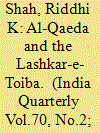

|
|
|
|
|
| Publication |
2014.
|
| Summary/Abstract |
Study of ideology is one of the most important domains of consideration for a successful counter-terrorism strategy. It is necessary to know and understand the ideology of a terrorist outfit coupled with the ongoing evolution at the same, its chief ideologues and its target audiences in order to provide an alternative ideology or in other words to win the 'hearts and the minds' of the people. This article traces the mounting similitude in the discourse and the actions of Lashkar-e-Taiba and the ideology of Al-Qaeda. The article begins with a brief depiction of the debate on the 'end of ideology' before proceeding on to an examination of Al-Qaeda's ideology. In the next section, LeT's discourse and actions from 1990 to 2010 are scrutinised followed by an analysis that attempts to draw out parallels between the ideologies of the two terrorist organisations. In the last section, the conclusion raises several pertinent points for the consideration of counter-terrorist specialists and policy makers.
|
|
|
|
|
|
|
|
|
|
|
|
|
|
|
|
| 5 |
ID:
133716
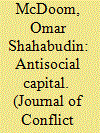

|
|
|
|
|
| Publication |
2014.
|
| Summary/Abstract |
Although popularly perceived as a positive force important for objectives such as economic development and democracy, social capital may also be linked to less desirable outcomes. This article highlights a dark side to social capital by pointing to its role in a particularly pernicious phenomenon: genocidal violence. Drawing on a survey of residents from one community that experienced violence during Rwanda's 1994 genocide, I show that individual participation in the violence was partly determined by the features of residents' social networks. Perpetrators possessed larger networks in general and more connections to other perpetrators in particular. The quality as well as quantity of connections also mattered. Strong ties generally, and kinship and neighborly ties specifically, were strong predictors of participation. In contrast, possession of countervailing ties to nonparticipants did not reduce a resident's likelihood of participation. Drawing on in-depth interviews to explore the possible mechanisms behind these findings, I suggest participants' networks fulfilled functions of information diffusion, social influence, and behavioral regulation. More broadly, the findings suggest the importance of social structure and social interaction for participation in collective violence. Relational data should complement individual attribute data in predicting participation. The findings also suggest, contrary to the neo-Malthusian interpretation, that the role played by Rwanda's extraordinarily high population density in the violence may have been more sociological than ecological in origin. The diffusion, influence, and regulatory effects of social connections are likely to be amplified in communities where individuals live in close spatial proximity to each other.
|
|
|
|
|
|
|
|
|
|
|
|
|
|
|
|
| 6 |
ID:
131480
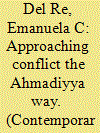

|
|
|
|
|
| Publication |
2014.
|
| Summary/Abstract |
The role and incidence of the Ahmadiya community in Israeli society, with its around 2,000 members, is not related to the dimension of the community, its religious activities or its dissemination on the territory. It is related to the strong social and political engagement of the community not only in religious but also in civil society activities where it resides, despite all the difficulties that derive from its disputed role in Islam. The Ahmadiyya community in Haifa constitutes a relevant example of contribution to peaceful and productive coexistence. Haifa itself is characterized by a very interesting social and political climate, by which it is considered a "model" of coexistence in Israel, despite the fact that many contrasts and contradictions persist, such as forms of discrimination and inequalities. The civil society is particularly active, and institutions and NGOs devoted to the Arab-Jewish dialogue are many. Religious and political leaders communicate and participate together in various events, where their openness and mutual respect are intended to symbolize harmony with the intent of this being mirrored by the whole society. The Ahmadiyya Community plays an active role in this evolving process. The author, who has carried out qualitative research in Haifa to film a scientific documentary on the Holiday of Holidays and the validity of the Haifa model of coexistence, applied participant observation in the framework of grounded theory to analyze the role and impact of the Ahmadiyya community in the complex Israeli context, also on the basis of extensive in depth interviews with community members and leaders
|
|
|
|
|
|
|
|
|
|
|
|
|
|
|
|
| 7 |
ID:
125075
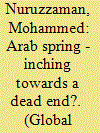

|
|
|
|
|
| Publication |
2013.
|
| Summary/Abstract |
A high degree of pessimism continues to hold a strong grip over the enthusiasts of democracy in the Arab world. In the last more than two years, the popular uprisings for social and political change have stalled in Bahrain, Syria, and Yemen. In Egypt, Libya, and Tunisia, where the populace succeeded in toppling the authoritarian rulers, the situation did not change that much. Violence, conflicts, and killings of political opponents disturbingly characterize all the Arab countries affected by the popular uprisings. In Syria, the government and opposition forces are locked in a deadly conflict with neither side being able to make a decisive breakthrough. The Egyptian army overthrew the country's first democratically elected government, headed by the Muslim Brotherhood, on 3 July 2013. On the whole, the success rate of democratization is so far disappointing. That begs the question whether the Arab popular uprisings for democratic change, what the media has conveniently dubbed the 'Arab Spring', are failing or still enduring.
|
|
|
|
|
|
|
|
|
|
|
|
|
|
|
|
| 8 |
ID:
125384
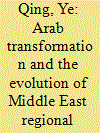

|
|
|
|
|
| Publication |
2013.
|
| Summary/Abstract |
Since its outbreak in the beginning of 2011, the Arab transformation that swept almost the whole middle east has now entered the third year with its geopolitical implications beginning to unfold gradually. When erupted in Tunisia and Egypt, it was driven primarily by internal dynamics and was regarded as a genuine local, bottom up movement in general. Much to people's surprise, incumbent regimes such as the Mubarak regimes in Egypt and Ben Ali regime in Tunisia that were once considered to be durable and formidable were too quick to be overthrown.
|
|
|
|
|
|
|
|
|
|
|
|
|
|
|
|
| 9 |
ID:
012367
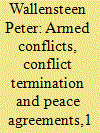

|
|
|
|
|
| Publication |
Aug.1997.
|
| Description |
339-358
|
|
|
|
|
|
|
|
|
|
|
|
|
|
|
|
| 10 |
ID:
125567
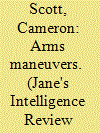

|
|
|
|
|
| Publication |
2013.
|
| Summary/Abstract |
The overthrow of Libyan leader Muammar Ghadaffi in 2011 prompted a flood of weapons into north Africa and the Middle East. Cameron Scott investigates the rise of illicit arms trafficking and its effects on regional stability.
|
|
|
|
|
|
|
|
|
|
|
|
|
|
|
|
| 11 |
ID:
131848
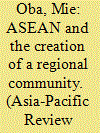

|
|
|
|
|
| Publication |
2014.
|
| Summary/Abstract |
After the ASEAN Concord II called for the building of an ASEAN Community in 2003, the creation of an ASEAN Community became a concrete part of the political agenda for the nations of Southeast Asia, and an ASEAN Community is scheduled to be created in 2015. However, it will all be for naught if the ASEAN Community that is established does not truly contribute to the stability and prosperity of the region. From this point of view, the article will attempt to evaluate the development of an ASEAN community concept and efforts to create it. To clarify the ideal of a true community, this article will take up Karl Deutsch's concept of "pluralistic security communities" and reconsider what a community requires. The article will state that the efforts to create an ASEAN Community should not be underestimated, and the blueprints for the creation of the ASEAN Community outline the formation of a true regional community. It will, however, conclude that in reality there exist factors within the ASEAN region that may shake the development of an ASEAN Community. It has to be said that the fostering of a sense of community at the level of ordinary people, as well as the creation of a community in which fundamental values and norms are shared, are distant propositions.
|
|
|
|
|
|
|
|
|
|
|
|
|
|
|
|
| 12 |
ID:
111969
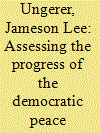

|
|
|
|
|
| Publication |
2012.
|
| Summary/Abstract |
This article analyzes the evolution of the democratic peace, beginning from the initial observation of a lack of wars and rarity of conflicts between democratic regimes to a number of competing and/or compatible explanations over the causality of the observed peace. A Lakatosian methodology is applied as a foundation for assessing the progress of the research program, according to the four traditionally recognized concepts: a hard core; a positive heuristic; a negative heuristic; and the auxiliary hypotheses. Theories are distinguished based on their theoretical and empirical progressiveness, as well as progressive intra-program problem-shifts. Explanations over the active causal process have often been seen as competitors, yet a Lakatosian framework enables seemingly inconsistent hypotheses to be grafted onto an existing research program, which can be determined to be progressive if they provide increased explanatory power and novel predictions that receive empirical corroboration. By these criteria, the research on capitalist development and the ongoing democratic peace research are not incompatible, provided that further additions to the research program ascertain the progressive criteria. Furthermore, by highlighting the areas that can best explain and predict the democratic peace phenomenon, the Lakatosian analysis offers insights for future progression in the field, as well as the areas upon which research should be focused.
|
|
|
|
|
|
|
|
|
|
|
|
|
|
|
|
| 13 |
ID:
090372
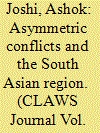

|
|
|
|
|
| Publication |
2008.
|
| Summary/Abstract |
The South Asian region is of considerable strategic importance for the entire world. An example of the foregoing is the fact that various sea lanes of communication and trading routes from West Asia to the Far East pass through this region. Again, of the seven nations in South Asia, two are nuclear states. Yet, strange as it may seem, some South Asian nations, while grappling with insurgency, terrorism, fundamentalism, illegal migration, poverty and organised crime, plan conflicts with their neighbours similarly affected.
|
|
|
|
|
|
|
|
|
|
|
|
|
|
|
|
| 14 |
ID:
124432
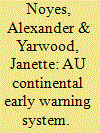

|
|
|
|
|
| Publication |
2013.
|
| Summary/Abstract |
Despite criticism from scholars, the Continental Early Warning System (CEWS) at the African Union (AU) has recently made significant progress in its capacity to monitor, analyse, and provide warning of impending conflict situations in Africa. However, CEWS remains constrained by human resource limitations, inchoate cooperation and information sharing with the early warning efforts of regional organizations, and unsystematic coordination with the various AU organs focusing on peace and security. Additionally, although the early warning-early response gap is narrowing at the AU, early response mechanisms continue to be constrained by limited capacity and issues of political will, as high-level political disagreements and issues of sovereignty militate against effective preventive action. Based on over two-dozen interviews with senior-level CEWS and AU officials, along with other relevant stakeholders, this paper highlights recent operational progress, identifies remaining gaps, and forwards policy options for the AU and international community to build on the gains of CEWS.
|
|
|
|
|
|
|
|
|
|
|
|
|
|
|
|
| 15 |
ID:
130174


|
|
|
|
|
| Publication |
2014.
|
| Summary/Abstract |
In responding to China's rise, the best strategy for Australia involves a combination of accommodation and ''soft balancing.'' The viability of this strategy is related to the extent to which U.S.-China relations are cooperative or conflictual. Recent Australian governments have been successful in implementing this preferred strategy.
|
|
|
|
|
|
|
|
|
|
|
|
|
|
|
|
| 16 |
ID:
127343
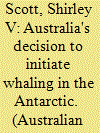

|
|
|
|
|
| Publication |
2014.
|
| Summary/Abstract |
On May 31, 2010, Australia instituted proceedings before the International Court of Justice in the case of Whaling in the Antarctic (Australia v. Japan). Although Australian politicians had for some time threatened such a course of action, the decision to proceed with international litigation took many observers by surprise, most basically because Japan appeared to be in a strong legal position and the risks associated with the case appeared greater than Australia's prospects for success. This article examines the background to the whaling dispute and suggests two ways in which litigation in the World Court may contribute to resolution of the dispute no matter the legal outcome of the case.
|
|
|
|
|
|
|
|
|
|
|
|
|
|
|
|
| 17 |
ID:
175418
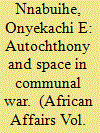

|
|
|
|
|
| Summary/Abstract |
Since the 1990s, there has been an upsurge in conflicts of autochthony in several parts of the world. Autochthony invokes a sense of a politics of belonging and an attachment to the land. In Nigeria, the phenomenon raises questions of citizenship and can reinforce exclusionary practices which in turn provoke widespread violence between different Nigerian populations. Infrastructure provision in a communal conflict environment is a critical element of autochthony struggle, which has yet to be fully explored. Relying on archival sources, focus group discussions, interviews and observation, this article interrogates how the interactions between autochthony and space stimulates communal conflicts and affect infrastructure provision in Jos, Nigeria. The article focuses on how the ‘Black September’ incident in 2001 and its aftermath in Jos has defined citizenship. It argues that the politics of belonging is embedded in infrastructure provision, and understanding this relationship is crucial to understanding and addressing the conflicts in Jos and beyond.
|
|
|
|
|
|
|
|
|
|
|
|
|
|
|
|
| 18 |
ID:
131988
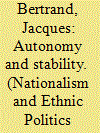

|
|
|
|
|
| Publication |
2014.
|
| Summary/Abstract |
Autonomy is often seen as an institutional instrument to manage substate nationalist conflict. Its implementation is key in determining its impact on conflict. While the central state might be satisfied with the absence of violence and stability as a measure of success, an aggrieved group will view success as gaining new powers and new resources. Autonomy often unravels when different goals are being pursued during implementation. "Special autonomy" in Papua failed because, first, the law was not the product of negotiation but of a solution that the central government imposed; second, Papuans remained divided on its utility and, ultimately, failed to seize the opportunity provided; third, the central government undermined the law in its attempts to curb secessionism, ultimately failing to make it credible.
|
|
|
|
|
|
|
|
|
|
|
|
|
|
|
|
| 19 |
ID:
124784
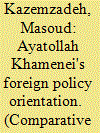

|
|
|
|
|
| Publication |
2013.
|
| Summary/Abstract |
This article analyzes the beliefs and patterns of behavior of Iran's Supreme Leader Ayatollah Ali Khamenei in regards to the nature of politics, political conflicts, and the role of agency in shaping events, strategy, and tactics. To do so, it discusses Khamenei's personal background, ideological formation, personality, and foreign policy statements.
|
|
|
|
|
|
|
|
|
|
|
|
|
|
|
|
| 20 |
ID:
129803


|
|
|
|
|
| Publication |
2014.
|
| Summary/Abstract |
Looking primarily at the Israeli side of the conflict, one sees many factors that have contributed to the failure of past peace efforts, most of which may be present or repeated in current (2014) and possibly future - attempts at peace making.
|
|
|
|
|
|
|
|
|
|
|
|
|
|
|
|
|
|
|
|
|